STATEHOUSE REPORT | ISSUE 23.06 | Feb. 9, 2024
BIG STORY: Surge in HOA complaints fuels calls for regulation
MORE NEWS: Hemp crackdown impacting state businesses
LOWCOUNTRY, Ariail: Gone fishin’
COMMENTARY, Brack: How 2 S.C. federal judges bolstered the rule of law
SPOTLIGHT: ACLU of South Carolina
ANOTHER VIEW: State needs to dump draconian abortion ban
MYSTERY PHOTO: Tidy building
FEEDBACK: State is missing out on more money than reported
Surge in HOA complaints fuels calls for regulation
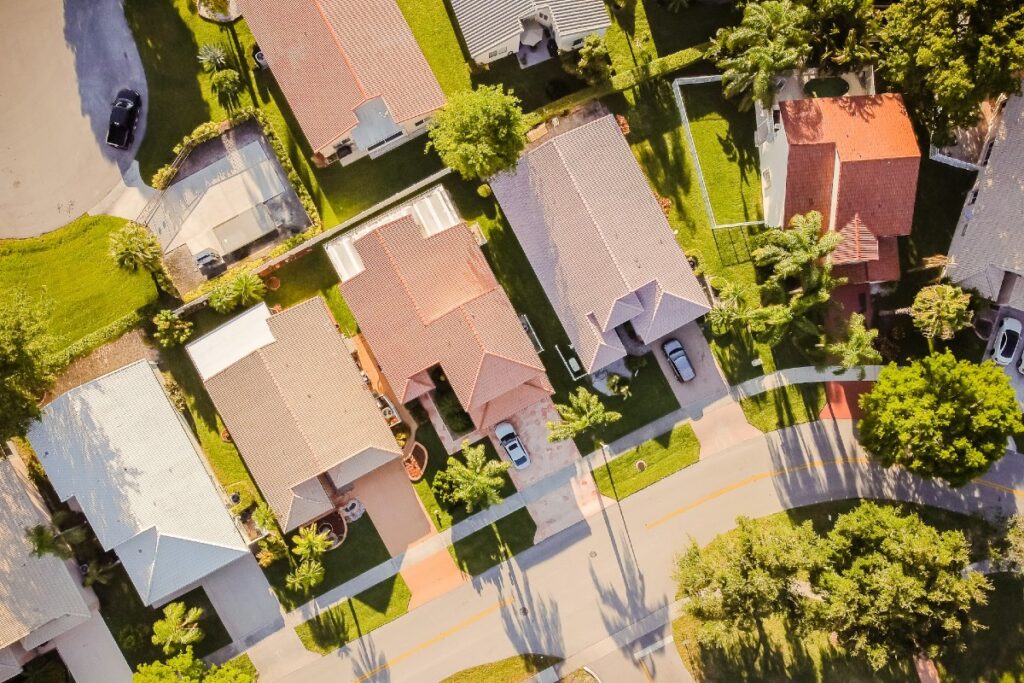
By Jack O’Toole | Consumer complaints against South Carolina homeowner associations (HOAs) have more than quadrupled since official record-keeping began in 2018, according to a new S.C. Department of Consumer Affairs report. And that’s part of what is fueling renewed calls for better HOA regulation in a state where more than 25% of residents live under association governance.
According to the report, S.C. residents filed 365 verified complaints in 2023 that raised a total of 742 specific concerns. A majority of complaints came from Horry, Richland and Charleston counties. The top three issues that were reported involved failure to enforce covenants and bylaws, concerns about maintenance and repairs, and disagreements with HOA fees and special assessments.
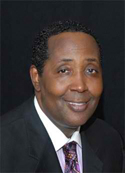
S.C. Sen. Darrell Jackson, a Richland County Democrat who has been advocating for comprehensive HOA reform since 2009, said he was “not surprised” by the report’s findings, given what he sees as the light regulations imposed by the legislature in the Homeowners Association Act of 2018.
“Even when that bill passed – it was all we could get at the time – I knew it would not stop the complaints,” Jackson said in an interview Thursday.
Under the 2018 act, HOAs are required to file their governing documents with a county’s Register of Deeds, notify members of proposed fee increases and ensure that prospective homeowners are informed that the property is part of an HOA. It also directs the state Department of Consumer Affairs to collect data on HOA complaints and compile it into an annual report.
“Based on this report and the anecdotal evidence I’ve seen, I think the time has come for us to revisit that,” Jackson said.
A large and growing presence
Usually found in subdivisions and condominium buildings, HOAs are self-governing membership organizations made up of all the homeowners in a given community. They are responsible for creating and enforcing community rules, and for maintaining common areas such as pools, parking lots and playgrounds. Rules can cover almost anything – from yard landscaping. to the color of mailboxes and garage doors, to the number and kinds of pets allowed – and are usually enforced with fines. According to the U.S. Census, the average monthly HOA fee paid by homeowners stands at $191.
At present, South Carolina is home to about 7,000 HOAs with more than 1.3 million residents – a number that likely will grow as developers continue to build 80% of their new houses in HOA-governed communities.
And according to a 2020 poll conducted for the Community Associations Institute, an industry trade group that lobbies on behalf of HOAs, the vast majority of those homeowners – about 90% – are satisfied with their HOA.
“The new research further strengthens our belief that community associations bring people together and create a place where neighbors grow, connect, and support each other in good and challenging times,” CAI’s chief executive officer Thomas M. Skiba said in a statement when the results were released. “CAI is proud to present these findings—especially as millions of dedicated homeowners volunteer and serve on their association boards and as professional managers work tirelessly to support neighborhoods where people are proud to call home.”
Nevertheless, HOA critics like Drew Radeker, a Columbia attorney who represents homeowners in HOA disputes, argue that many associations wield largely unchecked, quasi-governmental power over residents’ lives and need more robust state oversight.
“HOAs in South Carolina are rife with abuses of power,” said Radeker. “And it’s high time our legislature did something to rein them in.”
The fight over foreclosures
HOA reform efforts in South Carolina are currently focused on H. 3180, a House bill with bipartisan sponsors that would prohibit foreclosures by HOAs for unpaid fines or fees.
The issue of HOA foreclosures became a matter of particular public controversy in 2019, when the S.C. Supreme Court ruled in favor of Devery and Tina Hale, an Irmo couple whose home was foreclosed on by their HOA in a dispute over $250.
The house, worth well over $100,000 at the time, was ultimately sold at auction for $3,000 – an outcome the high court called “unconscionable.”
Jackson, who says he’s seen families facing HOA foreclosures in the church that he pastors, is a strong supporter of the proposed legislation.
Just as important, though, he’d like to see more support in the General Assembly for the kind of comprehensive reform bill he introduced in 2009. But he believes it would take real public pressure to move it forward.
“When I see people whose lives have been torn apart, I don’t understand why there isn’t more of an outcry,” Jackson said. “I would urge people to call their legislators and say we need relief.”
- Jack O’Toole reports on statewide issues for Statehouse Report and the Charleston City Paper. Have a comment? Send to: feedback@statehousereport.com.
Hemp crackdown impacting state businesses

Staff reports | Some S.C. businesses that market some legal hemp products are making changes less than a month after the state Department of Health and Environmental Control (DHEC) issued a sweeping letter to food and beverage makers warning against advertising THC products.
Meanwhile in related news, the state Senate again is considering a medical marijuana bill that would legalize the limited use of medical marijuana in South Carolina, continuing a years-long push by advocates to pass the legislation. Senators ended debate Thursday without taking a vote.
This week in Charleston, seltzer brand High Rise Beverage Co. announced it will pause distribution of hemp seltzers. In Greenville, the owner of a Greenville hemp shop previously raided by the State Law Enforcement Division (SLED) has said his business lost millions of dollars and that he planned to pull his business out of South Carolina until the government could provide more clarity on what is and is not legal in regards to hemp products.
DHEC’s Jan. 22 letter to the legal hemp industry declared that product labels for hemp-infused foods and drinks should not advertise that they contain THC, CBD or Delta-9 — all naturally occurring in hemp oil. High Rise reportedly plans to launch a hemp and THC-free line of adaptogen seltzers in March called the “Blackout Edition.”
A measure proposed in November, House Bill 4628, calls for legalization of hemp-derived cannabinoid products containing Delta-8 and other forms of THC as long as they abide by federal limits. The law would also impose product testing and packaging requirements and an age requirement of 21 on hemp products.
Also in recent headlines:
![]() Only Anne Frank Center in U.S. is in Columbia. A modern-day friendship between two scholars — one Dutch, the other a South Carolinian — “set in motion” the possibility of a partner center for Amsterdam’s famous Anne Frank House, to be at the University of South Carolina (USC) in Columbia. The Anne Frank Center opened in 2021 and is the only partner site in the United States. Other locations are in Berlin and Buenos Aires.
Only Anne Frank Center in U.S. is in Columbia. A modern-day friendship between two scholars — one Dutch, the other a South Carolinian — “set in motion” the possibility of a partner center for Amsterdam’s famous Anne Frank House, to be at the University of South Carolina (USC) in Columbia. The Anne Frank Center opened in 2021 and is the only partner site in the United States. Other locations are in Berlin and Buenos Aires.
S.C. House speaker, Senate president trade barbs over judicial selection process. A contentious push to change the way South Carolina elects its judges has been simmering in the Statehouse for months. Elections on dozens of judges are delayed.
S.C. woman files lawsuit challenging state’s abortion ban. A South Carolina woman who says she tried to follow the rules embedded in South Carolina’s six-week abortion ban but was forced out of state for care is now suing for clarification and an injunction. More information is below in “Another View.”
State death penalty up for debate again in high court. South Carolina’s Supreme Court heard arguments Feb. 6 over the constitutionality of the firing squad and electric chair as death penalty methods.
Trump to make campaign stop in Horry County. Former President Donald Trump is making his way to the Grand Strand on Saturday to host a “Get Out the Vote” rally at Coastal Carolina University’s HTC Center.
- Haley opens up on Trump during SNL appearance.
- Biden captures landslide win in S.C.’s Democratic presidential primary.
Gone fishin’
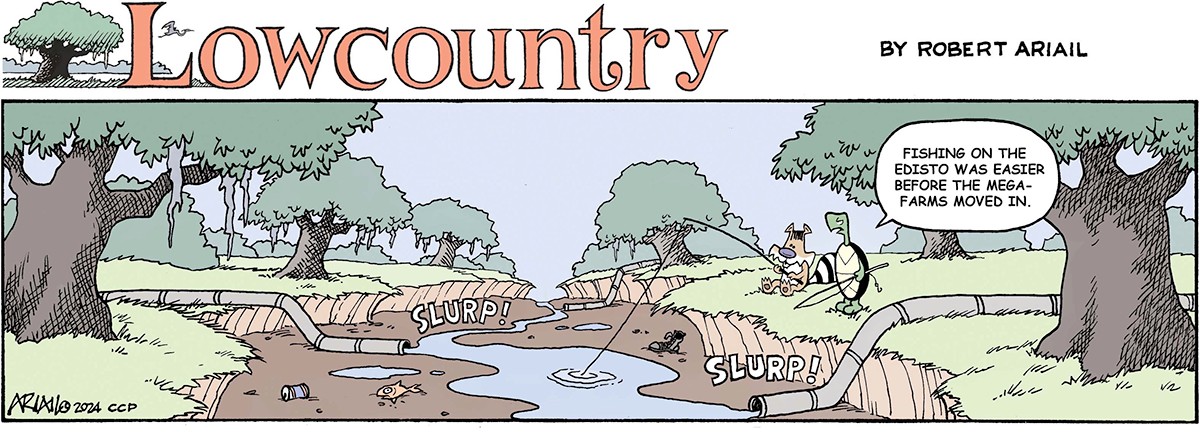
Award-winning cartoonist Robert Ariail generally has a biting or funny comment about the great state of South Carolina in his weekly cartoon. This week, he offers a look at the impact of major amounts of water by mega-farms from some of South Carolina rivers.
- Love the cartoon? Hate it? What do you think: feedback@statehousereport.com.
How 2 S.C. federal judges bolstered the rule of law
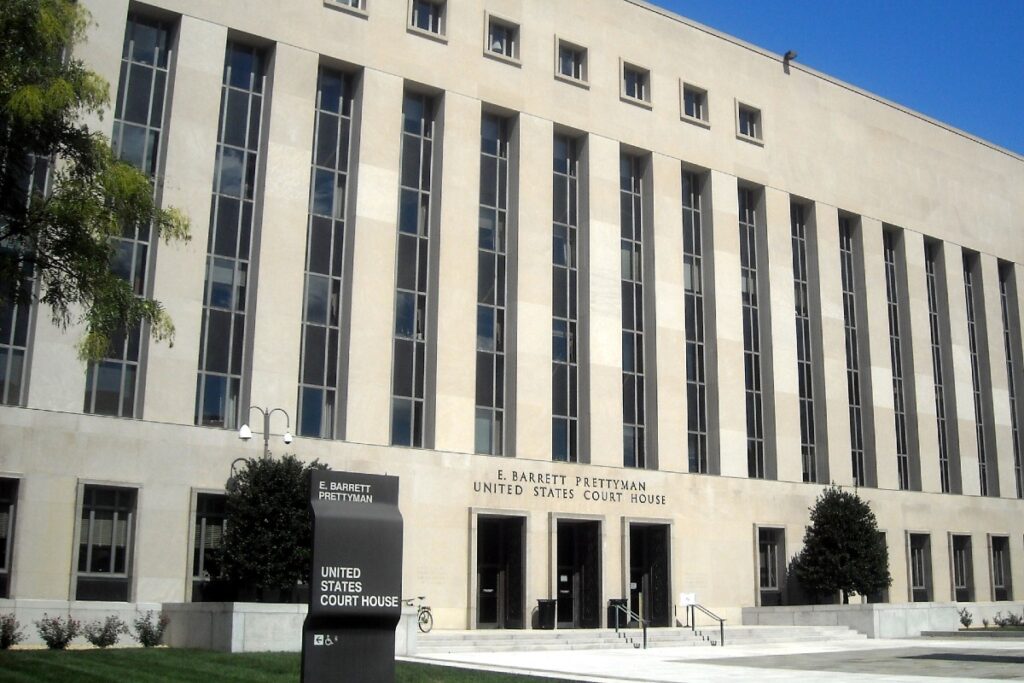
By Andy Brack | You might have missed something pretty significant in the onslaught of national news – how two federal appellate judges making a mark on democracy have ties to South Carolina.
 On Feb. 6, a three-judge panel at the U.S. Court of Appeals for the D.C. Circuit ruled against former President Donald Trump’s claim that he was immune from prosecution on charges he plotted to overturn the 2020 election. While the ruling surely will create more delay-motivated appeals from the Trump team, it also kickstarts one of four big criminal cases against the former president that has been frozen.
On Feb. 6, a three-judge panel at the U.S. Court of Appeals for the D.C. Circuit ruled against former President Donald Trump’s claim that he was immune from prosecution on charges he plotted to overturn the 2020 election. While the ruling surely will create more delay-motivated appeals from the Trump team, it also kickstarts one of four big criminal cases against the former president that has been frozen.
Among the jurists united in the ruling was U.S. Circuit Judge Karen L. Henderson, appointed to the appellate court in 1990, four years after being appointed a U.S. district judge in South Carolina by the late President George H.W. Bush, a Republican. While Henderson attended college and law school in North Carolina, she served in the S.C. Attorney General’s office from 1973 to 1983, eventually becoming deputy attorney general.


A more recent addition to the D.C. circuit court is U.S. Circuit Judge Michelle Childs, a Columbia lawyer who became a state circuit court judge in 2006. Four years later, she was appointed by former President Barack Obama, a Democrat, to serve at the U.S. District Court for the state. In 2022, just months after being one of three names floated as a candidate to replace U.S. Supreme Court Justice Stephen Breyer, President Joe Biden appointed her to the federal appellate bench in Washington, D.C., a court often considered second in prominence to the Supreme Court.
Along with Biden-appointed Circuit Judge Florence Pan, these judges unanimously ruled that Trump was not above the law in the case against him for actions related to the Jan. 6, 2021, insurrection at the U.S. Capitol.
“We cannot accept former President Trump’s claim that a president has unbounded authority to commit crimes that would neutralize the most fundamental check on executive power – the recognition and implementation of election results,” the judges wrote in the decision.
What’s important here is that two judges with a deep South Carolina background in supporting the rule of law were key in the ruling to support a basic tenet of American democracy – the separation of powers. They supported a fundamental strength of our form of government – that there are three equal branches of government, each with checks and balances to keep power distributed. If one branch becomes too laden with power, the others – and democracy – suffer.
“It is both unique and important that these two judges, both with strong South Carolina ties, appointed by presidents of two different parties, joined Judge Pan in a unanimous decision as to Trump’s immunity,” said Greenville political analyst Chip Felkel.
“This is not a partisan decision. It was a ‘mic drop’ that was thorough, succinct and to the point. It was a great example of the judiciary taking the proper steps, offering a well-reasoned and firm decision on a controversial topic.”
The bipartisan decision will make it difficult for Trump supporters to criticize with a straight face. South Carolina’s two Republican U.S. senators, for example, had great things to say about Childs, appointed by a Democrat, when she was being considered for the highest court in the land.
“She certainly has been received with great acclaim from South Carolinians on both sides of the aisle,” U.S. Sen. Tim Scott, R-S.C., said in 2022. “I think she has a strong record and would be a strong candidate.”
His colleague and vocal Trump supporter Lindsey Graham was even more forceful. He reached out to the White House in 2022 to share his backing.
“I can’t think of a better person for President Biden to consider for the Supreme Court than Michelle Childs,” he said then.
The rule of law won one this week. Let’s hope it stays on track.
Andy Brack is editor and publisher of Statehouse Report and the Charleston City Paper. Have a comment? Send to: feedback@statehousereport.com.
ACLU of South Carolina
 The ACLU of South Carolina is dedicated to preserving and advancing the civil liberties and civil rights enshrined in the United States and South Carolina Constitutions. Working in the courts, legislature, and communities, we fight for racial justice, reproductive freedom, LGBTQ equality, voting rights, criminal legal reform, and much more. The ACLU stands up for these rights even when the cause is unpopular, and sometimes when nobody else will.
The ACLU of South Carolina is dedicated to preserving and advancing the civil liberties and civil rights enshrined in the United States and South Carolina Constitutions. Working in the courts, legislature, and communities, we fight for racial justice, reproductive freedom, LGBTQ equality, voting rights, criminal legal reform, and much more. The ACLU stands up for these rights even when the cause is unpopular, and sometimes when nobody else will.
- More: www.aclusc.org
State needs to dump draconian abortion ban
Editor’s Note: This editorial was published in today’s issue of the Charleston City Paper, our sister publication.
And now we start seeing the pain.
![]() Too many South Carolina women are hurting and scared because of blinders worn by conservative state lawmakers, mostly White men, hellbent on controlling lives, decisions and bodies. It’s the 21st century, but these prudish, unenlightened South Carolina officials are acting as if the times are more like those when slavery was legal.
Too many South Carolina women are hurting and scared because of blinders worn by conservative state lawmakers, mostly White men, hellbent on controlling lives, decisions and bodies. It’s the 21st century, but these prudish, unenlightened South Carolina officials are acting as if the times are more like those when slavery was legal.
Since the South Carolina Supreme Court flipped its view last August that a statewide abortion ban was an unconstitutional invasion of privacy, hundreds of women in the Palmetto State have been suffering, forced to have babies that they don’t want for a variety of reasons. Or they have to go outside of South Carolina to have an abortion that was legal here just three years ago.
Legal abortion is a safe medical procedure used by one in four women in the U.S. during child-bearing years, medical experts agree. Women who opt for abortions do so for a variety of personal — and sometimes medical — reasons. But because South Carolina now has a so-called “fetal heartbeat” law that essentially bans abortions six weeks after a woman gets pregnant — a time that many do not even know they’re pregnant — conditions are untenable.
In recent months, Planned Parenthood clinics here turned away 75% of women who sought abortions, according to a new lawsuit seeking clarification of the ban. From Aug. 23, 2023, to Jan. 31, 2024, the organization, which operates two of the three clinics in South Carolina, turned away 906 of 1,209 women who sought abortions. Of those, 778 had pregnancies that were nine weeks or less from their last menstrual period.
In the same span a year earlier, the clinics provided 1,819 abortions. “Put differently, over the same period of time, [Planned Parenthood] was able to provide less than 17% of the abortions it did before the act went into effect, and the number of people making abortion appointments dropped substantially.”
South Carolina resident Taylor Shelton and Planned Parenthood now are suing. Shelton says she realized she was pregnant — even though she was using birth control — in her fourth week. She tried to follow the rules in South Carolina, but couldn’t get the treatment she wanted. She was forced to make expensive, time-consuming trips to North Carolina to get the safe treatment she sought.
“I was forced to jump through so many unnecessary hoops in order to receive the care I deserved,” Shelton said in a statement. “The entire experience left me angry and quite frankly, traumatized. I want everyone to understand the impact South Carolina’s abortion restrictions and unfair treatment are having on real people, and I hope my story shows how punitive and cruel these abortion bans actually are.”
The state’s courts need to approve a request for an injunction from the draconian abortion ban as it clarifies the case before it. Otherwise, more of South Carolina’s women will suffer under this unsafe, unhealthy law that needs to be thrown out like the trash it is.
Tidy building
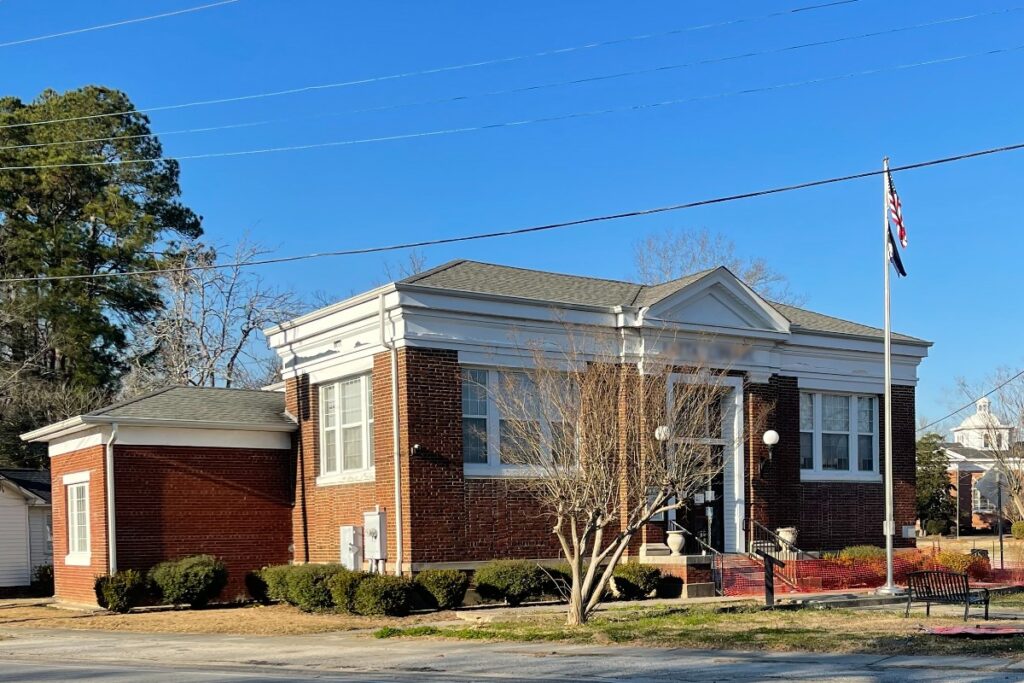
Here’s a tidy building somewhere in South Carolina sent in by a long-time reader and photo sleuth. What is this place. Where was this photo taken? Send us your guess as well as your name and hometown to feedback@statehousereport.com.
 Last week’s mystery photo, “Big smile,” showed a giant Buddha that was at a North Myrtle Beach putt-putt course in the 1980s.
Last week’s mystery photo, “Big smile,” showed a giant Buddha that was at a North Myrtle Beach putt-putt course in the 1980s.
Allan Peel of San Antonio, Texas, writes that the statue “was once a central feature of Golden Dragon Golf miniature golf course in the mid-1980s in North Myrtle Beach. Originally located at 4205 Highway 17 South, this particular attraction is now defunct, although remnants of it were rebuilt to form the Hawaiian Village Mini-Golf course that is now located at the same location.”
Others who correctly identified the smiling Buddah were: Elizabeth Jones and Jay Altman, both of Columbia; David Lupo of Mount Pleasant; Pat Keadle of Wagener; Bill Segars and Don Clark, both of Hartsville; George Graf of Palmyra, Va.; and Frank Bouknight of Summerville.
- Send us a mystery picture. If you have a photo that you believe will stump readers, send it along (but make sure to tell us what it is because it may stump us too!) Send to: feedback@statehousereport.com and mark it as a photo submission. Thanks.
State is missing out on more money than reported
To the editor:
This estimate $65 million [of federal money not being accepted for summer feeding for kids] would go directly into local economies and largely go to small businesses. And since a dollar spent with a local small business circulates through the economy 3 times, that $65 million is actually a $195 million impact on local economies that will be lost.
Then there is the McMaster proposed increase in pay to public school teachers. I guaranteed that those teachers would support the federal summer food program so that when the kids come back to school in the fall they will be healthier and better able to learn.
– Frank Knapp, Columbia
Send us your thoughts
We encourage you to send in your thoughts about policy and politics impacting South Carolina. We’ve gotten some letters in the last few weeks – some positive, others nasty. We print non-defamatory comments, but unless you provide your contact information – name and hometown, plus a phone number used only by us for verification – we can’t publish your thoughts.
- Have a comment? Send your letters or comments to: feedback@statehousereport.com. Make sure to provide your contact details (name, hometown and phone number for verification. Letters are limited to 150 words.
- ORDER NOW: Copies are in Lowcountry-area bookstores now, but if you can’t swing by, you can order a copy online today.
- Now available as an e-book!
ABOUT STATEHOUSE REPORT
Statehouse Report, founded in 2001 as a weekly legislative forecast that informs readers about what is going to happen in South Carolina politics and policy, is provided to you at no charge every Friday.
- Editor and publisher: Andy Brack, 843.670.3996
- Correspondent: Jack O’Toole
Donate today
We’re proud to offer Statehouse Report for free. For more than a dozen years, we’ve been the go-to place for insightful independent policy and political news and views in the Palmetto State. And we love it as much as you do.
But now, we can use your help. If you’ve been thinking of contributing to Statehouse Report over the years, now would be a great time to contribute as we deal with the crisis. In advance, thank you.
Buy the book
Now you can get a copy of editor and publisher Andy Brack’s We Can Do Better, South Carolina! ($14.99) as a paperback or as a Kindle book ($7.99). . The book of essays offers incisive commentaries by editor and publisher Andy Brack on the American South, the common good, vexing problems for the Palmetto State and interesting South Carolina leaders.
More
- Mailing address: Send inquiries by mail to: P.O. Box 21942, Charleston, SC 29413
- Subscriptions are free: Click to subscribe.
- We hope you’ll keep receiving the great news and information from Statehouse Report, but if you need to unsubscribe, go to the bottom of the weekly email issue and follow the instructions.
- Read our sister publication: Charleston City Paper (every Friday in print; Every day online)
- © 2024, Statehouse Report, a publication of City Paper Publishing, LLC. All rights reserved.















 We Can Do Better, South Carolina!
We Can Do Better, South Carolina!